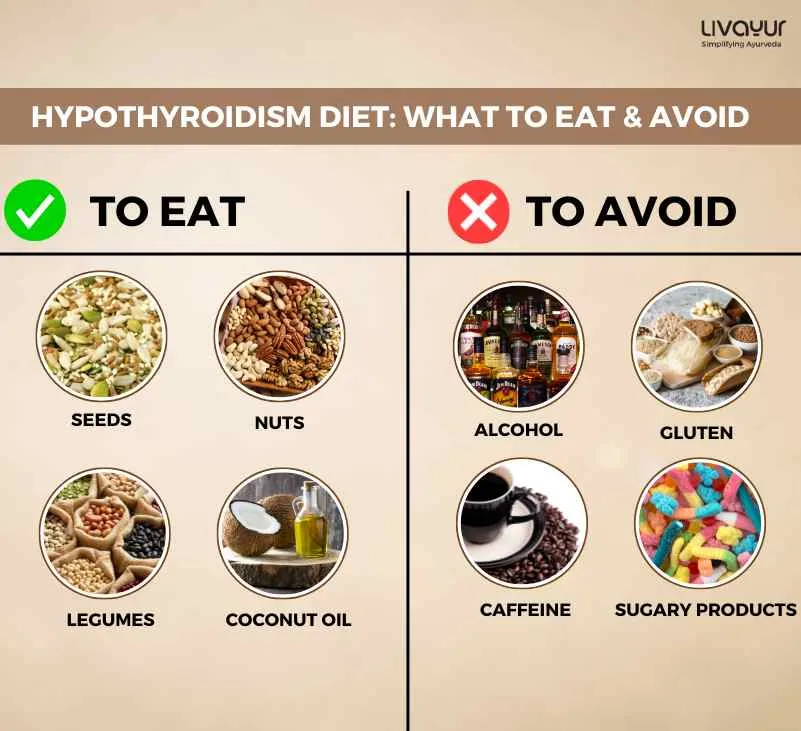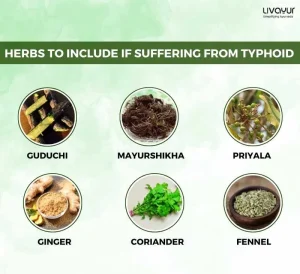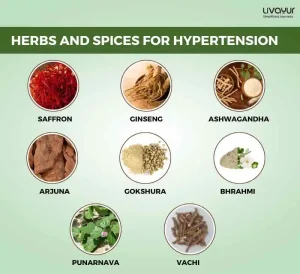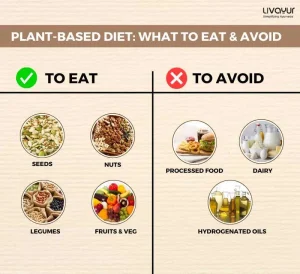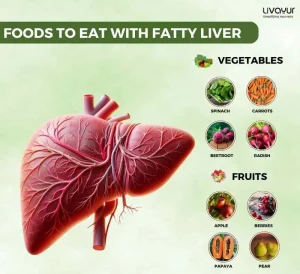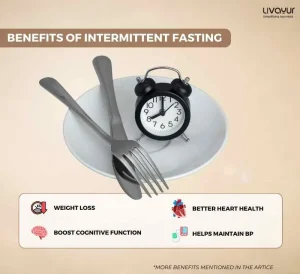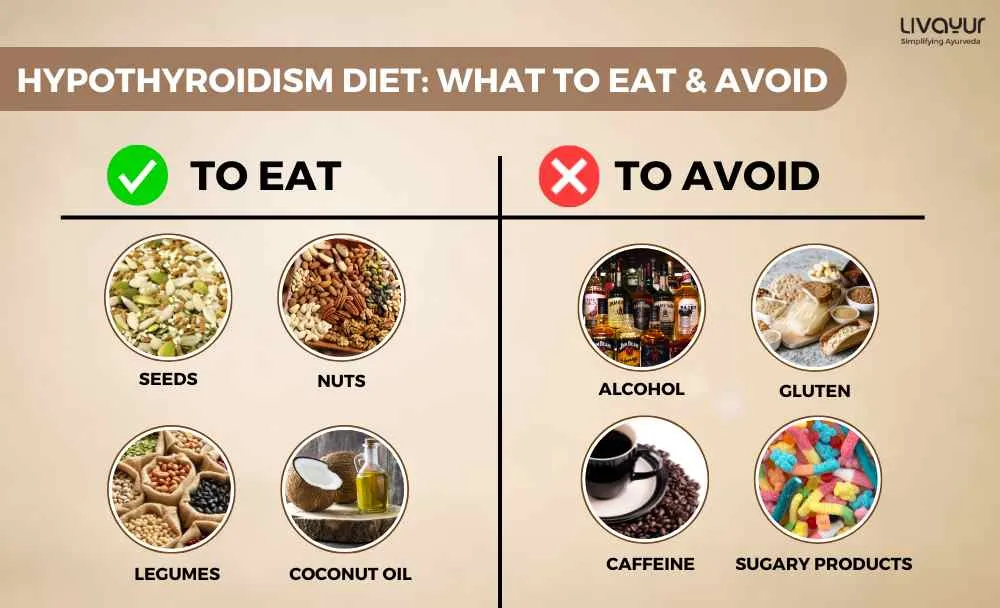
Hypothyroidism is a common condition characterized by an underactive thyroid gland, which leads to a slowdown in the body’s metabolic processes. A well-balanced hypothyroidism diet can be crucial in managing hypothyroidism and alleviating its symptoms. By incorporating certain foods and avoiding others, individuals with hypothyroidism can support their thyroid function and overall health. [1]
According to Ayurveda, the development of hypothyroidism may be attributed to various factors such as Kaphavataja Prakopaka, Agnimandya Janaya, and Rasa pradoshaka Nidana. These factors, combined with lifestyle choices and excessive consumption of sweet-tasting foods (madhur ras), can lead to an imbalance in the digestive fire (Agni) and the creation of undigested food waste (Ama) in the gut, marking the onset of the disease process. [8]
In this article, we will study the key principles of a hypothyroidism diet, discussing what to eat and avoid.
What to Eat: Nutrient-Rich Foods for Hypothyroidism
Iodine-Rich Foods:
Iodine is vital for thyroid hormone synthesis and hypothyroidism diet. Including iodine-rich foods can be beneficial, especially if hypothyroidism is due to iodine deficiency. Good sources of iodine include seaweed, fish (such as cod and tuna), and some grains and bread. [2]
Selenium:
Selenium is crucial for the conversion of the thyroid hormone T4 (thyroxine) to its active form, T3 (triiodothyronine). Meat products, followed by fish, pasta or rice, and bread or cereals are excellent sources of selenium and hypothyroidism diet. [3]
Zinc:
Zinc supports thyroid function and helps convert T4 to T3. Zinc is present in foods like oysters, beef, chicken, nuts, and seeds. [4]
Protein:
Adequate protein intake is essential for producing and converting thyroid hormones. Include lean protein food sources such as chicken, turkey, fish, legumes, and tofu into your diet. [1]
Whole Grains:
Complex carbohydrates in whole grains offer sustained energy and support metabolic function. Opt for healthy whole grains like brown rice, quinoa, oats, and whole wheat bread for a hypothyroidism diet. [1]
Cruciferous Vegetables (in moderation):
While cruciferous vegetables like kale, cauliflower, and turnips contain goitrogens, which can interfere with thyroid function in large amounts, they are safe to include in your hypothyroidism diet chart when cooked and consumed in moderation. [2]
Coconut oil:
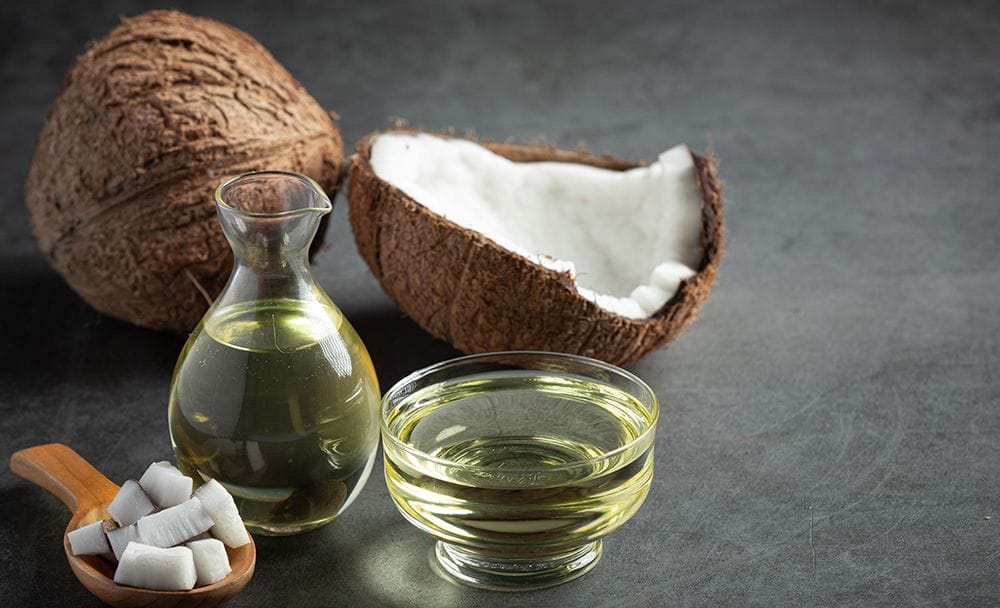
Researchers recommend incorporating coconut oil as a significant component in the hypothyroidism diet due to its content of medium-chain fatty acids and antioxidant properties. [1]
Seeds:
Sprouted flax and chia seeds can provide the body with alpha-lipoic acid (ALA), which helps regulate the thyroid gland’s function. Moreover, sprouted grains of cereals and legumes are also beneficial for individuals looking for a weight loss diet plan for hypothyroidism. [1]
What to Avoid: Foods that May Worsen Hypothyroidism
Excessive Goitrogenic Foods:
Cruciferous vegetables like broccoli, cauliflower, cabbage, and Brussels sprouts contain goitrogens that can interfere with thyroid hormone production and your hypothyroidism diet plan. [6]
Soy Products:
Soy contains goitrogens and may inhibit thyroid hormone synthesis. Limiting the consumption of soy-based products like soy milk, tofu, and edamame is advisable, especially if iodine intake is inadequate and if you are looking for ways how to cure hypothyroidism with diet. [2]
Gluten:
Some individuals with hypothyroidism may have an underlying sensitivity to gluten, and its consumption could exacerbate symptoms. So diet for hypothyroidism patients should be a gluten-free diet if you suspect gluten intolerance. [5]
Excessive Caffeine:
High caffeine intake may interfere with thyroid hormone absorption and exacerbate nervousness or anxiety, common symptoms in some cases of hypothyroidism. [7]
Highly Refined Sugars:
Foods with refined sugars can lead to sudden spikes and crashes in blood sugar levels, affecting energy levels and metabolism, and is not the best diet for hypothyroidism. [8]

Alcohol:
Alcohol can disrupt thyroid hormone production and may interact with thyroid medications, reducing their effectiveness. [6]
FAQs
What are some lifestyle tips for managing Hypothyroidism?
Apart from following a hypothyroidism-friendly diet, some lifestyle tips can further support thyroid health:
Engage in daily physical activity, as exercise can help boost metabolism and improve overall well-being.
Chronic stress can negatively impact thyroid function. Practice stress-reduction strategies such as meditation, yoga, or deep breathing exercises.
Try to get quality sleep as it plays a vital role in hormone regulation and overall health.
Work closely with your doctor to monitor thyroid function and adjust medications if necessary.
What is the cure for Avatu-alpkriyata or hypothyroidism diet in Hindi?
According to Ayurveda, excessive consumption of sweet-tasting foods (madhur ras) is the primary cause of Thyroid goiter. Increased intake of madhur ras can worsen Hypothyroidism symptoms. In Ayurveda, Nidana Parivarjana (avoidance of causative factors) is a fundamental treatment approach for any disease, including Thyroid goiter. Applying the Deepana-Pachana therapy to address Ama Dosha strengthens Jatharagni, leading to improved Bhootagni and Dhatvagni regulation. This Ayurvedic therapy not only offers symptomatic relief but also helps maintain cellular metabolism. Therefore, avoiding madhur ras can be beneficial in managing Hypothyroidism. [8]
What is a 7 day hypothyroid diet plan Indian households?
If you are wondering how to cure hypothyroidism with diet in 7 days you should include food items like fruits, milk, quinoa upma, boiled egg salad, pumpkin soup, vegetables, and turmeric milk in your diet.
Conclusion
A well-balanced hypothyroidism diet tailored to support thyroid function is crucial for individuals living with the condition. By incorporating nutrient-rich foods like iodine, selenium, and antioxidants while avoiding excessive goitrogens and processed foods, individuals can help manage their symptoms and promote overall health. Adopting a healthy lifestyle and following medical advice can lead to better management of hypothyroidism and a better quality of life.
Disclaimer:
This article is written from a health and wellness perspective only and is not a piece of medical advice. Kindly seek the help of a certified medical practitioner before initiating any treatment.
References:
- Hypothyroidism Diet Plan
- The role of micronutrients in thyroid dysfunction
- Selenium and Thyroid Disease: From Pathophysiology to Treatment
- The Role of Zinc in Thyroid Hormones Metabolism
- Thyroid Diseases and Diet Control
- Role of dietary factors in thyroid disorders: A primary care perspective
- Does How Caffeine Can Increase Thyroid Hormone Levels?
- Sugar induced hypothyroidism in Ayurveda – comparative review study




